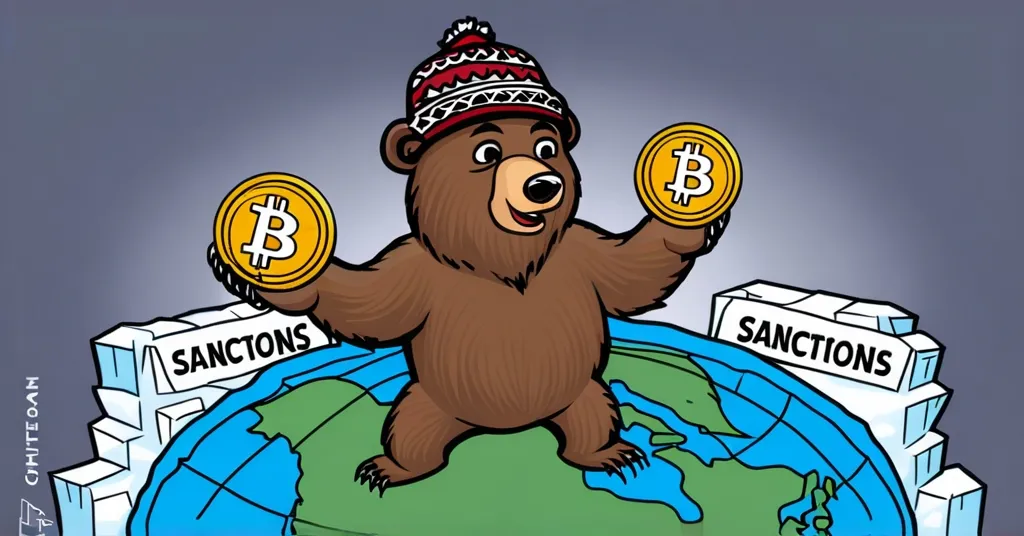Russia Embraces Bitcoin for Trade Amid Sanctions: A Strategic Crypto Thaw

Russia’s Crypto Thaw: Embracing Bitcoin for International Trade Amid Sanctions
Russia’s relationship with cryptocurrencies is undergoing a significant shift, moving from stringent regulations to a more permissive stance. This “Crypto Thaw” is driven by Western sanctions and a strategic push for de-dollarization (reducing reliance on the U.S. dollar in international transactions), with President Putin legalizing the use of Bitcoin for international trade.
- Russia’s Crypto Thaw
- Bitcoin for International Trade
- Impact of Sanctions and Bitcoin Mining
In 2020, President Putin signed a digital finance asset regulation that allowed cryptocurrency transactions but prohibited their use as a domestic payment method. However, in 2022, the Russian central bank issued a recommendation to ban the creation, exchange, and mining of cryptocurrencies due to concerns over the well-being of its citizens. This stance shifted again in 2024 when Putin signed new legislation, effective from November 1, 2024, legalizing the limited use of crypto for international trade.
This strategic pivot is not just about embracing new technology. It’s a calculated response to Western sanctions that have compelled Russia to explore alternative ways to handle money and keep its economy running. Finance Minister Anton Siluanov acknowledges this shift, stating:
Russian companies increasingly use Bitcoin for international trade, and Putin is not going to hurdle this process.
While this thaw is a strategic move, it remains cautious. Domestic use of crypto for payments is still strictly off-limits, indicating that Russia is not ready to let Bitcoin run wild within its borders just yet.
The strategic move towards cryptocurrencies also aligns with Putin’s long-standing goal of de-dollarization. As one insider notes, “The American dollar may face troubles,” highlighting the potential impact of Bitcoin’s rise on the USD. Another adds, “Bitcoins harm the dollar more than the ruble,” reflecting Russia’s strategic advantage in this new financial game.
Bitcoin mining plays a significant role in Russia’s crypto strategy. Russian oligarch Oleg Deripaska, known for his influence in various industries, has substantial investments in Bitcoin mining through companies like the Russian Mining Company (RMC) and BitRiver. Looks like he’s not just mining for metals anymore! However, in 2022, the U.S. Treasury imposed sanctions on BitRiver. The company’s CEO, Igor Runets, maintained that these sanctions were more about stifling competition than any real Kremlin ties.
Russia’s evolving relationship with cryptocurrencies is a fascinating dance of economic strategy and geopolitical maneuvering. It’s a tale of necessity meeting innovation, with a dash of rebellion against Western financial dominance. As Russia cautiously embraces Bitcoin for international trade, it’s clear that the Crypto Thaw is not just a thaw but a strategic thaw, one that could have ripple effects far beyond its borders.
Potential Risks and Challenges
While Russia’s shift towards cryptocurrencies may seem like a smart move, it’s not without its risks. Regulatory hurdles at home and potential international backlash could pose significant challenges. Critics argue that embracing cryptocurrencies might lead to increased volatility and financial instability. Moreover, the energy-intensive nature of Bitcoin mining could raise environmental concerns, adding another layer of complexity to Russia’s strategy.
Future Outlook
Looking ahead, Russia’s continued exploration of cryptocurrencies could shape global financial dynamics. As more countries follow suit in seeking alternatives to traditional currencies, the landscape of international trade could shift dramatically. However, the success of this strategy depends on navigating the aforementioned risks and adapting to a rapidly evolving financial environment.
Key Takeaways and Questions
-
What is the “Crypto Thaw” in Russia?
The “Crypto Thaw” refers to Russia’s recent shift from stringent cryptocurrency regulations to a more permissive stance, driven by the need to bypass Western sanctions and support de-dollarization efforts.
-
How has Russia’s cryptocurrency policy evolved since 2020?
Since 2020, Russia has moved from a gray zone status for cryptocurrencies to allowing their use in international trade while still prohibiting them as a domestic payment method. For more details on the policy, see this overview.
-
What role do Western sanctions play in Russia’s crypto policy?
Western sanctions have pushed Russia to explore cryptocurrencies as a means to conduct international trade, circumventing traditional financial systems affected by these sanctions. For further discussion, check out this analysis.
-
What is the significance of Bitcoin mining in Russia?
Bitcoin mining in Russia, particularly by entities linked to influential oligarchs like Oleg Deripaska, plays a crucial role in supporting the country’s crypto strategy and economic resilience against sanctions.
-
How does Russia’s use of Bitcoin affect the U.S. dollar?
By using Bitcoin for international trade, Russia contributes to de-dollarization efforts, potentially weakening the U.S. dollar’s dominance in global trade and reserve status. Public discussions on this topic can be found here.



